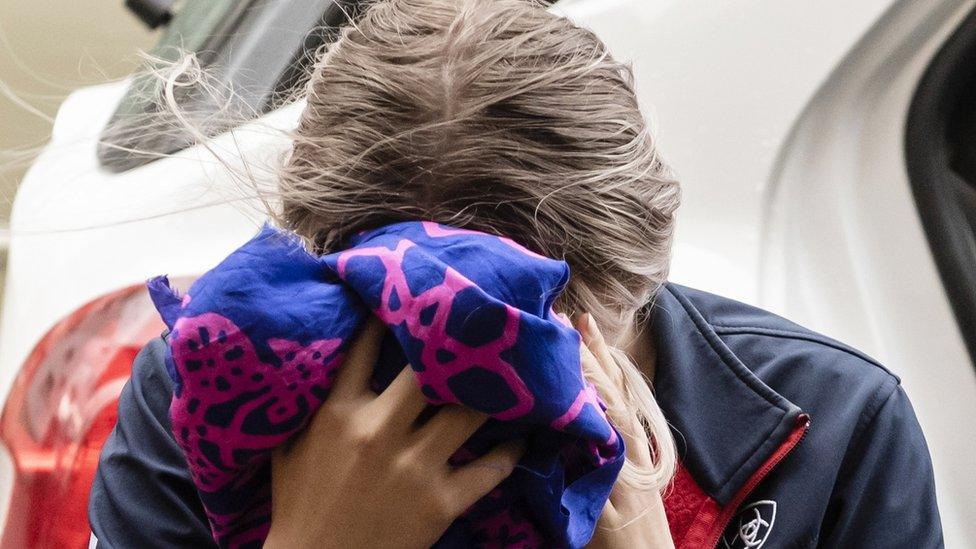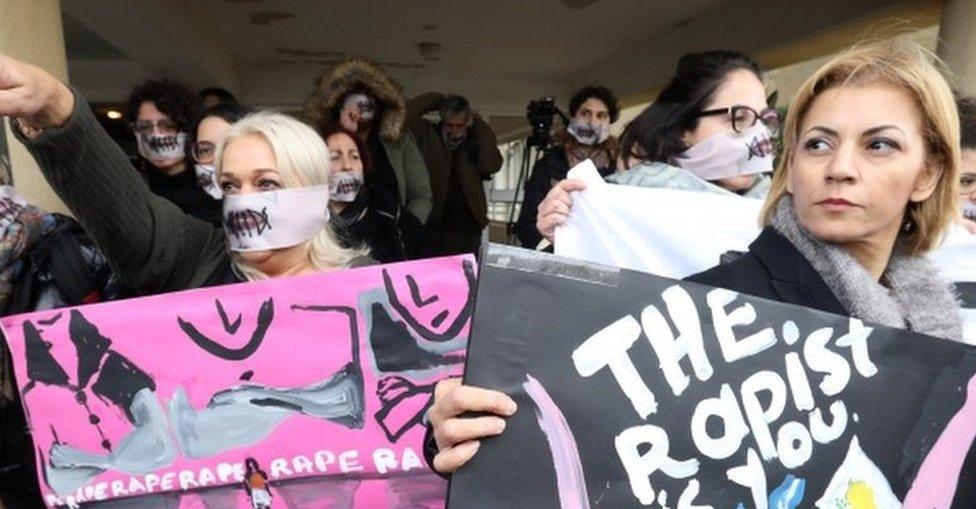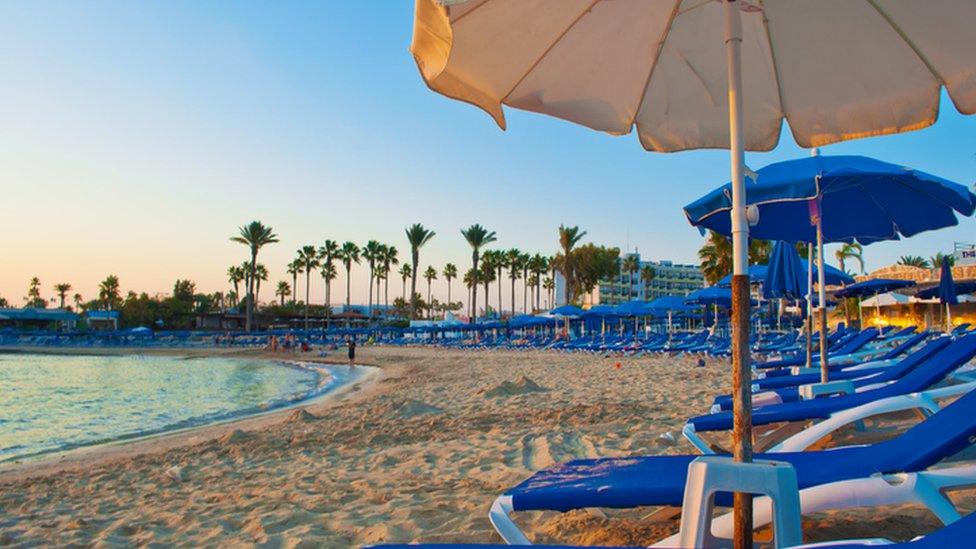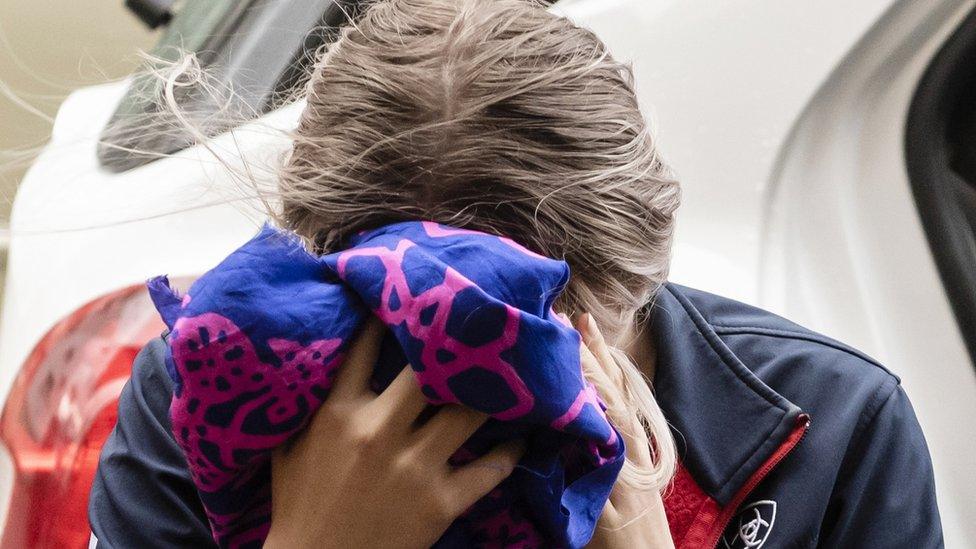Ayia Napa: Mother of convicted Briton backs Cyprus boycott
- Published

The mother of a British woman convicted of lying about being gang-raped said she needed treatment for PTSD
The mother of a British woman convicted in Cyprus of lying about being raped by 12 Israeli men has backed calls for tourists to boycott the country.
The 19-year-old was found guilty of causing public mischief, prompting the Foreign Office to express "serious concern" about the case in Ayia Napa.
Critics of the verdict have called for people to avoid visiting Cyprus.
The woman's mother told the BBC that Ayia Napa - where her daughter had been on a working holiday - was unsafe.
The 19-year-old was convicted following a trial after recanting a claim that she was raped in a hotel room in July.
The teenager has said Cypriot police made her falsely confess to lying about the incident at a hotel - something police have denied.
Speaking to BBC Radio 4's Today programme, the teenager's mother - who the BBC is not naming - said she believed her daughter's experience in Ayia Napa was not an isolated incident.
She said: "The place isn't safe - it is absolutely not safe. And if you go and report something that's happened to you, you're either laughed at, as far as I can tell, or, in the worst case, something like what's happened to my daughter may happen."
Lawyer Michael Polak described it as "a very worrying conviction"
The Independent's travel editor Simon Calder said about one in three visitors to Cyprus were British, with more than 1.3 million Brits visiting Cyprus in 2019.
He told BBC Radio 4's PM programme his two daughters and their friends have said they would not travel to Ayia Napa, adding: "I imagine that there are similar conversations going on around the kitchen table in many homes with teenage children."
However, he said he doubted the Foreign Office would implement a travel ban because Cyprus is "generally a very safe country for British travellers".
Lawyers representing the woman have criticised the conviction and the way the case was handled by the Cypriot police and Judge Michalis Papathanasiou.
They say her retraction statement was given when no lawyer or translator was present and point to the fact the judge refused to hear any evidence about whether the alleged rape took place.
The Foreign Office has described the conviction as "deeply distressing" and pledged to raise the issue with Cypriot authorities.
Several senior legal figures in Cyprus have signed a letter written to the Attorney General Costas Clerides asking him to intervene in the case, including former Justice Minister Kypros Chrysostomides.
Mr Chrysostomides said the teenager had "already suffered a lot" and he expects her sentence will be "very lenient".
He added: "She has already been in detention for four and a half weeks and she has already been prevented from travelling for about five months already."
The teenager faces up to a year in jail and a £1,500 fine when she is sentenced on 7 January, but he said such punishments would be "excessive under the circumstances".
The woman's mother said she had not personally heard from the Foreign Office, but added that she "would love" Foreign Secretary Dominic Raab to get involved.
She said she understood that the judicial process had to be followed but "when that starts becoming broken" it was necessary for the authorities to step in, adding that her daughter had experienced human rights violations "throughout" the process.

Protesters from the Network Against Violence Against Women were outside the court
She also questioned the authenticity of her daughter's retraction statement - local police said it had been written by her daughter but she cited an expert witness who said it was "highly improbable" that it had been produced by a native English speaker.
When delivering the guilty verdict on Monday, the judge said his decision was backed up by video evidence showing the woman having consensual sex.
But her mother said the video showed her daughter having consensual sex with one man, and then it showed a group of people trying to enter the room.
"[The video] shows her and the guy telling them to get out of the room," she said. "That gives you a very strong flavour of what happens next."
The 12 men arrested in connection with the alleged rape were later released and returned home. A lawyer representing some of them welcomed the guilty verdict, saying the woman had "refused to this day to take responsibility for the horrible act she's done against the boys".
'Re-think her options'
The woman's mother said her daughter was experiencing post-traumatic stress disorder, hallucinations, and was sleeping for 18 or 20 hours a day because of a condition called hypersomnia.
"She needs to get back to the UK to get that treated - that's my absolute primary focus. She can't be treated here because hearing foreign men speaking loudly will trigger an episode...
"It needs resolving otherwise she's going to carry on having this for the rest of her life."
The woman's mother also revealed that her daughter had planned to start university this year after being accepted by all of the universities she applied for.
"She'd been offered a bursary at one of them - she'd got three unconditional offers.
"So, no question, she would have gone to university, but it was in a career that she wouldn't be able to do with this 'public mischief' verdict, so - again, life-changing for her - she needs to totally rethink her options."
The woman's legal representatives have already said they plan to appeal against the conviction.
The woman's mother said they plan to take the case to the Cyprus Supreme Court, but there is a long waiting list.
"Our lawyers are looking at what can be done to expedite that, and that's maybe something the Foreign Office could help us with, so to get that as soon as we can."

Ayia Napa is a popular holiday destination, known for its nightlife and beaches
A GoFundMe page for legal costs has raised more than £80,000 towards a target of £100,000.
The woman's mother said she was "astounded" by the support, but believed legal costs would end up being even greater than that.
"Unfortunately we're going to have to increase the target in a little bit to appeal with the appeal process.
"I'm not totally sure what the figure needs to be to do that yet, but we will be doing that."
Human rights campaigner Joan Smith told the BBC that the Foreign Office's strong response to the verdict was a "very unusual" and "welcome" intervention.
She said: "They wouldn't have done it if they hadn't felt that there were serious questions about the fairness of the trial that she's been through, but also the events leading up to that trial."
The Cypriot government responded to criticism by saying it had "full confidence in the justice system and the courts".
- Published30 December 2019

- Published19 December 2019
